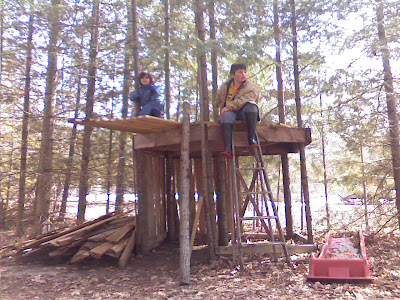
Most of you know by now that the younger people that live with me (aka my children) learn at home. Some of you may not know that we do not use a “boxed curriculum”. Don’t freak out. My adult children did not use a boxed curriculum either and they are happy, healthy, productive adults. The longer we learn at home the more I am convinced that forcing a child to work through a boxed curriculum is completely unnecessary, and even harmful.

I found this article, which is based on research on the topic of learning, including learning that took place long before organized education existed. It is quite interesting, and effectively reaffirms my experiences with “curriculum”. It answers the question, “How do hunter-gatherer children learn what they need to know to become effective adults within their culture?.” This is a great question since my hope for my children is that they become happy, healthy, productive people.
Although we are not "hunter-gatherers", we do understand that humans are hard wired with the need to learn. No one needs to teach another how to do it or force another to do it. We are naturally driven to learn every day.

The Wisdom of Hunter-Gatherers by Peter Gray, Ph.D.
1. Hunter-gatherer children must learn an enormous amount to become successful adults.
It would be a mistake to think that education is not a big issue for hunter-gatherers because they don't have to learn much.

2. The children learn all this without being taught.
Although hunter-gatherer children must learn an enormous amount, hunter-gatherers have nothing like school. Adults do not establish a curriculum, or attempt to motivate children to learn, or give lessons, or monitor children's progress.

3. The children are afforded enormous amounts of time to play and explore.
In response to our question about how much time children had for play, the anthropologists we surveyed were unanimous in indicating that the hunter-gatherer children they observed were free to play most if not all of the day, every day.

4. Children observe adults' activities and incorporate those activities into their play.
Hunter-gatherer children are never isolated from adult activities. They observe directly all that occurs in camp.

He concludes his paper stating:
The desire to grow up is a powerful motive that blends with the drives to play and explore and ensures that children, if given a chance, will practice endlessly the skills that they need to develop to become effective adults.

So I do not plagiarize the author, Peter Gray, Ph.D., I shared only the highlights of the article. If you wish to read more you may find the rest of this article here

No comments:
Post a Comment